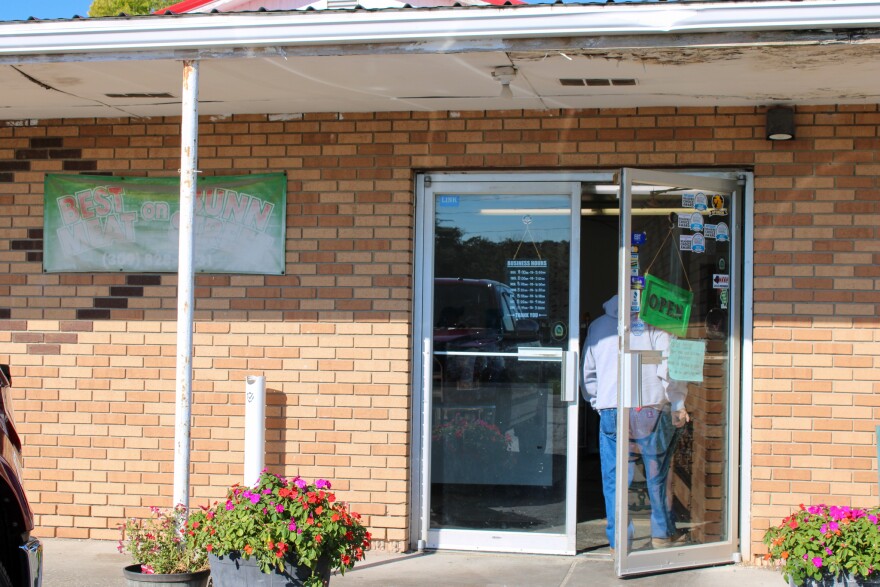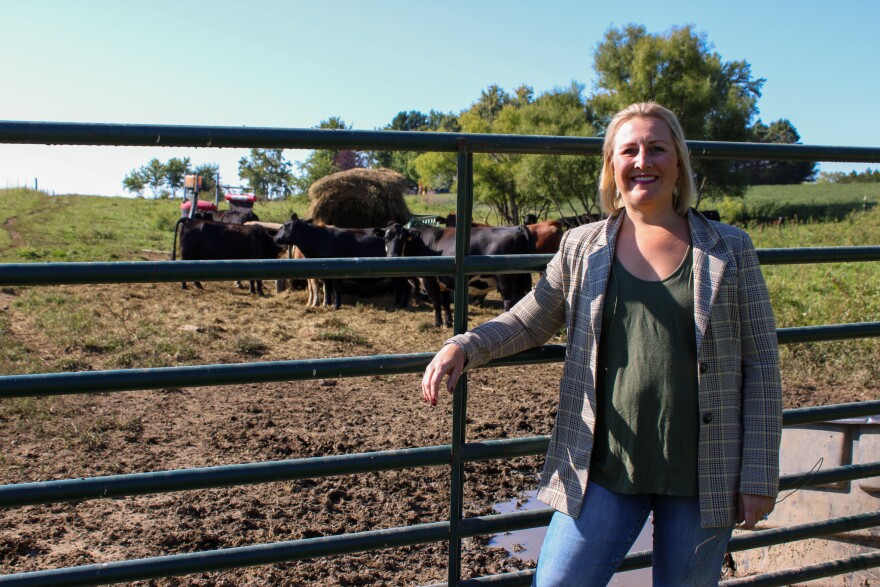When cows drink water, it’s loud. They breathe heavily as they slurp and smack their lips.
For Heyworth farmer Jaqueline Witte, it’s a beautiful sound.
“That’s one of my favorite sounds ever,” she said. “I just love it.”
A less loved part of farm life that Witte and others don’t always talk about, though, is the stress. This doesn’t make it any less real.
Studies spanning the past several years have shown mental health conditions are common among agriculture professionals and their families. Suicide rates are also higher among farmers and ranchers than in other occupations.
But Illinois agriculturists have been lucky, accounting for less than 1% of total deaths by suicide in the state between 2015 and 2020. This is according to data from Northwestern University, which manages the state’s Violent Death Reporting System.
And it’s not just a local problem or a state problem. It’s a national problem — and women are often forgotten in the conversation.
“No one ever asks a woman about their agricultural stress,” said Co-Lead on the Cultivating Resiliency project Doris Mold.
The project is out of the Upper Midwest Agriculture Safety and Health Center. It started in 2018 when 90% of the roughly 300 agriculture women in a digital questionnaire said they saw the occupation as a stressor.
Since then, Mold and her co-lead have been hosting virtual support group sessions for women all over the country to talk about their mental health.
While men account for more of the deaths by suicide, women seem to see similar rates of stress. Women also face unique stressors — whether they’re active producers on the farm or not.
Mold said that men tend to stress about the farm itself. The crops, animals and finances. Women think about all those factors and more.
“They take on their spouses’ stress, their kids' stress, if they're taking care of their parents, or their in-laws,” she said. “Women aren't just focused on themselves. They're taking care of everybody else.”
Local farm women

This is true for Witte, who manages her job off the farm, raises four kids, helps with the family meat company — Bloomington Meats — and assists on the farm wherever she may be needed.
Like so many other farmers, Witte’s main stress is finance. She said this is why she also works full-time as an energy advisor at Growmark.
“I feel one of the best ways to manage stress is to tackle what stresses you out the most,” she said.
On the farm, she and her husband Matt raise beef cattle and sheep. They also grow corn and soy.
During harvest season, Jaqueline Witte said it’s not uncommon to rarely see her husband.
“I always joke though, when it comes springtime, you know come March or April or whatever it's like, ‘Well, good seeing you Matt,’” she said. “‘See you again in nine months or something.’”
Witte said the reality for farm couples is they have to divide and conquer all tasks. For her and Matt, this means he handles the majority of the farm work and the meat market, and she takes point on the children.
“So the downside of that is, is that we do not spend nearly as much time together as we'd like, but, you know, that's just the most efficient and effective way to go about things to get everything done,” she said.
With such a large operation, Witte said she can sometimes lose track of her husband. On a recent day at the meat market, she was looking for him only to find out he’d had to take over slaughter duty when multiple workers had called in sick.
“It's just always … a juggle, as it is with any family and any job but we're gonna just figure it out,” she said.


Farm life and operations never stop. Even for women like Witte who are frequently taken off the farm for other work.
The same can be said for Rachel Fulton, a farmer and agribusiness woman in LeRoy. She’s a digital business manager with Corteva Agriscience. In this role, she’s often either driving the company truck somewhere or sitting in virtual meetings at home on her porch.
Fulton and her husband each work full-time jobs off the farm while raising two kids, two dogs, and their farm animals. They have rabbits, which they sell locally for meat, chickens, guineas, and currently, some leftover pigs from the county fair.
It’s a full farm, and it keeps them all busy.
Fulton said that even when she’s doing work from home, she thinks about everything else that needs to be done.
“I have the pressure to do laundry, my dishes, you know, dust and vacuum, clean up my kid's rooms, or come out here and do chores, weed the garden,” she said. “But I also have work meetings to do and places to be.”
Similar to Doris Mold, Fulton said women on farms play multiple roles.
“I'm everything all the time,” she said. “I'm a mother while we're sitting here. I'm an employee while we're sitting here. I'm a farmer while we're sitting here. I'm Rachel. I'm one person, just be that one person, and make sure you take time for her as well.”

A national issue
Research shows that this is the way women on farms nationwide feel. Florence Becot, an associate research scientist at the National Farm Medicine Center in central Wisconsin, would know.
She conducted a survey gathering women from across sectors in ag.
“We had women from dairy farms, talking in [the] same groups that women who had large raw crops operations — 1000s [of] acres — and in the same group, we might have had women from a diversified vegetable production,” she said.
Becot said these women had never met before, but they said the same thing.
“All of these women were like, ‘Huh, like, I feel that we spend a lot of time talking about how we're different from one type of agriculture to another,’” she said. “And what they were seeing was, ‘Man, like your challenges are similar to mine.’”
Adrienne DeSutter, a motivational speaker for mental health in agriculture and a stay-at-home mom on a farm near Galesburg, said she found the same to be true in her own experiences. Her advocacy for farmer mental health started a few years ago when she and her husband launched Sow Hope Grow Hope.
“It began as personal conversations of just sharing some of our own my husband and I’s, our truth, you know, our stories, our stressors locally,” she explained.
From there, she said it “rapid fire” became a state and then a national conversation.
Before she decided to move to her husband’s farm, DeSutter was a school counselor. Now, she is mainly a caretaker. Her role in farm production is less active, but as she explains it, she still interacts with it daily.
“In a farm family, the farm itself isn't just a career, it's an additional part of your home,” she said.
So even though she’s not working with the crops, she knows all about them. Like when they need to be tended to.
“The tasks that need completed on a farm aren't in an office somewhere when you leave your home,” she said. “They're staring outside your window. I'm looking outside, literally right now at crops that I can tell, you know, what needs done to those crops.”
DeSutter and Heyworth farmer Witte have never met. But they both say almost the same thing.
DeSutter talks about how her husband might be gone all day.
“He leaves before we wake up and he comes home right as we're getting ready to head to bed or after the kiddos have gotten to bed,” she said.
Witte talks about how she can look outside and feel the pressure to do farm work.
“It's just hard to look out the window and see, you know, chores that [need] to be done or things around the farm that you'd like to attend to,” she said.


Two women, living different lives on different farms, playing very different roles on those farms, create an echo.
DeSutter said she sees this happen in her national conversation with women in ag.
“You're not dealing with necessarily the same exact stressor or the same exact struggle, but across the country, no matter what people are farming, I'm continually hearing people say, ‘Oh, my gosh, you get it,” she said. “’You know. You understand us. You understand what it is that we're going through.’”
Addressing the problem
Farm stress is not a foreign concept, Whether the focus is on women, men, or the children and other family members.
Illinois alone has funded numerous efforts to bring awareness and mental health care to rural areas, including a recent grant program from Gov. JB Pritzker for the FFA youth group to start raising mental health awareness.
But a reality of agriculture stress is that so much of what happens on a farm is beyond control. Researcher Becot said that doesn’t mitigate the stress.
Becot said uncontrollable factors of farm life, like crop pricing and weather, tend to be the most stressful parts of the job.
Becot said she would like to see more research done on the best methods to address these concerns.
“That is where it's sorely lacking,” she said.
In the meantime, farm families can continue seeking out already available resources. For Illinois, that means taking advantage of Southern Illinois University’s Farm Family Resource Initiative, which offers up to 6 free phone call therapy sessions for individuals or farm families throughout the state.
Illinois Farm Bureau (IFB), located in Bloomington, can also connect farmers with resources in the state or nationwide.
Despite these resources, hurdles for some farmers in need of assistance still linger. Donna Gallivan, conference and program manager with IFB, said one of her main goals is to make sure farmers feel comfortable seeking help.
“Sometimes a farmer doesn't want to see their truck sitting in the doctor's parking lot,” she said. “They're a little bit proud of that kind of stuff that they want to keep that out of the local community's view.”
There’s also a lack of hospitals in rural communities, which can complicate the issue.
“Farmers aren't going to get out of tractors and drive an hour to get help … or they won’t,” she said.
In these cases, Gallivan said she suggests telehealth opportunities.
Help closer to home


Women like Fulton and Witte said they find comfort in their families, who also do farmwork and live close by.
Over in LeRoy, Rachel Fulton said she relies on her parents, and the women in McLean County and surrounding areas for support.
“Leaning on each other is important, whether that's just venting to each other, knowing that you're not in it alone, or having somebody to actually come help you, and being OK asking for help when you're drowning.”
Fulton said Jaqueline Witte in Heyworth is part of her support network too, as they’re close friends.
Despite the stress that frequently comes with living on a farm, Fulton said she would not trade it in for another life. She loves being in that world.
“Agriculture brings us all together, and we are kind of in that unique area where we don't just go to work and turn it off when we come home,” She said. “It's kind of constant, but it's important, and it's fulfilling to be a part of it.”
Stress is an inevitable part of life. Even more so with farm life. Still, it does not decrease the love these women have for the craft and the experience.
As Jaqueline Witte puts it, the farm is home.
“I can smell the hay and just the smell of the cattle and the mud and the manure,” she said. “That smells like home to me.”
For farmers in need of immediate help, there is always the Farm Aid Hotline at 1-800-FARM-AID, or the national Suicide and Crisis Lifeline 988.



